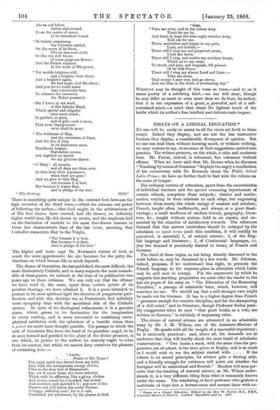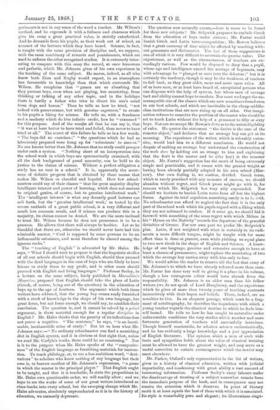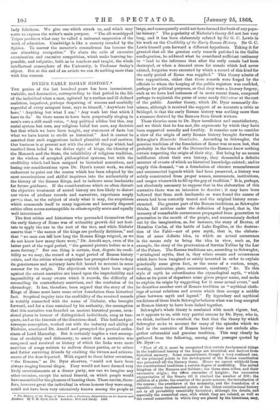ESSAYS ON A LIBERAL EDUCATION.* No one will be ready
to assent to all the views set forth in these essays. Indeed they display, and are not the less instructive because they display, a considerable divergence of opinion. But no one can read them without learning much, or without wishing, we may venture to say, to see some of their suggestions carried into practice. The writers preserve, on the whole, a calm and moderate tone. Mr. Farrar, indeed, is vehement, but vehement without offehce. When we have said that Mr. Bowen when he discusses " Teaching by means of Grammar "displays too angry a recollection of his controversy with Dr. Kennedy about the Public School Latin Primer, we have no further fault to find with the volume on the score of temper.
The ordinary routine of education, apart from the eccentricities of individual teachers and the special cramming departments of certain schools, comprises these subjects ; classics and mathe- matics, varying in their relations to each other, but engrossing between them nearly the whole energy of masters and scholars ; French, taught often inefficiently, and always at a great disad- vantage ; a small modicum of modern history, geography, litera- ture, &c., taught without system, held in no repute, and un- assisted by the stimulus of satisfactory rewards. The reformers demand that this narrow curriculum should be enlarged by the admission on equal terms (and this condition, it will readily be perceived, is essential) 1, of natural science ; 2, of the Eng- lish language and literature ; 3, of Continental languages, i.e. (for the demand is practically limited to these), of French and German.
The third of these topics, as not being directly discussed in the work before us, may be dismissed in a few words. Mr. Johnson, indeed, proposes, if we understand him right, to promote the French language to the supreme place in education which Latin may be said now to occupy. For the arguments by which he supports this startling proposition we must refer the reader to the last six pages of his essay on " The Education of the Reasoning Faculties," a passage of admirable force, which, however, will convince no one. We should say that a still stronger case might be made out for German. It has in a higher degree than French " grammar enough for coercive discipline, and for the shampooing of a dull mind," and its literature, though Professor Seeley possi- bly exaggerates when he says " that good books, as a rule, are written in German," is certainly of surpassing value.
The claims of natural science are advocated in an admirable essay by Mr. J. M. Wilson, one of the Assistant-Masters of Rugby. He speaks with all the weight of a successful experience ; he is eminently practical ; and, above all, his demands are so moderate that they will hardly shock the most timid of scholastic conservatives. " Two hours a week, with the same time for pre- paration out of school, is the time given at Rugby, and is as much as I would wish to see the subject started with If the reform is on sound principles, let science gain a footing only, and a friendly struggle for existence will point out whether the foreigner will be naturalized and flourish." Readers will soon per- ceive that the teaching of. natural science, as Mr. Wilson under- stands it, is a very different thing from what is commonly known under the name. The wandering or local professor who gathers a multitude of boys into a lecture-room and amuses them with ex-
* Essays on a Liberal Education. Edited by the Rev. W. Farrar, M.A., F.E.S., Assistant-Master at Harrow. London : Macmillan and Co. 1867.
periments is not in any sense of the word a teacher. Mr. Wilson's method, and he expounds it with a fullness and clearness which give his essay a great practical value, is strictly catechetical. And he demands from his pupils, as their work out of school, an account of the lectures which they have heard. Science, in fact, is taught with the same precision of discipline and, we suppose, with the same machinery of rewards and punishments, which are used to enforce the other recognized studies. It is extremely inter- esting to compare with this essay the record, at once humorous and pathetic, which Mr. Johnson gives of his own experience in the teaching of the same subject. He moves, indeed, as all who know both Eton and Rugby would expect, in an atmosphere less favourable to knowledge than that which surrounds Mr. Wilson. He complains that " games are so absorbing that they prevent boys, even when not playing, but sauntering, from thinking or talking of any other topic, and in the holidays there is hardly a father who tries to divert his son's mind from dogs and horses." Then be tells us how he tried, " not indeed with perseverance, but with genuine eagerness," to create in his pupils a liking for science. He tells us, with a frankness and a modesty which do him infinite credit, how he " crammed " for this purpose. And of the results all that he can say is, that " it was at least better to have tried and failed, than never to have tried at all." The secret of this failure he tells us in a few words. " The boys did no exercises ;" " the questions which be had so laboriously prepared were hung up for 'volunteers' to answer." No one knows better than Mr. Johnson that no study could prosper under such a system. "Nothing short of an incorporation into the school work in which boys are systematically examined, with all the dark background of penal necessity, can be held to do justice to the claims of science. Without a perfect obligation a study has no root in a school." It is, apparently the assur- ance of definite progress that is obtained by these means that makes Mr. Wilson so cheerful and hopeful. How few school- masters could say of their classes " that the great majority display intelligent interest and power of learning, which does not amount to original genius, of course, but to genuine intellectual work." The ' intelligent interest' is what any decently good lecturer can call forth, but the genuine intellectual work,' as tested by the severe methods of a great public school, is a very different and much less common result, and if science can produce this in a majority, its claims cannot be denied. We are the more inclined to trust Mr. Wilson because he does not pronounce it to be a panacea. He allows that there will always be boobies. Let us be thankful that there are, otherwise we should never have had this admirable answer, " Coal is supposed by some persons to be an inflammable substance, and must therefore be classed among the igneous rocks."
The "teaching of English" is advocated by Mr. Hales. He says, " What I should wish to propose is that the linguistic studies of all our schools should begin with English, should then proceed with the dead languages in the case of boys who are likely to have leisure to study them to any profit, and in other cases should proceed with English and living languages." Professor Seeley, in a lecture on the same subject, lately published in Macmillan's Magazine, proposed that English should take the place of Latin (Greek, of course, being out of the question) in the education of boys up to the age of fourteen. The argument which both these writers have adduced, that the young boy comes ready furnished with a stock of knowledge in the shape of his own language, has great force, but not force enough, we should say, to establish their conclusion. The question is, and it cannot be solved by a priori argument, is there material enough for a regular discipline in English ? Mr. Hales thinks that the paucity of its inflections does not prove a negative. "The sentence," he says, "is an inesti- mable, inexhaustible mine of study." But let us hear what Mr. Johnson says:—" No ordinary schoolmaster can find a nourishing diet in English syntax, and it is obvious at first sight that, unless we read Mr. Carlyle's works, there could be no construing." Nor is it to the purpose when Mr. Hales speaks of the " composite- ness " of the English language as furnishing materials for instruc- tion. To teach philology, or, to use a less ambitious word, " deri- vations" to scholars who know nothing of any language but their own is, to borrow another of Mr. Johnson's expressions, "a game in which the master is the principal player." That English ought to be taught, and that it is teachable, to state the propositions in Mr. Hales own questionable order, we will readily allow ; and we hope to see the works of some of our great writers introduced as class-books into every school, but the sweeping change which Mr. Hales advocates, absolutely unprecedented as it is in the history of education, we earnestly deprecate. The question now naturally occurs,—how is room to be found for these new subjects ? Mr. Sidgwick proposes to exclude Greek from the education of boys under sixteen ; Mr. Farrar would banish Greek and Latin verse-composition ; Mr. Bowen believes that a great economy of time might be effected by teaching with- out grammars and dictionaries. The last of these suggestions is one of which it is very difficult to ascertain the precise value. The experiences, as well as the circumstances, of teachers are ex- ceedingly various. Few would be disposed to deny that a pupil, whose age and intelligence exceed the average of beginners, may with advantage be " plunged at once into the delectus ;" but it is certainly the tendency, though it may be the weakness, of teachers to fall back, as they grow older, more and more upon rules. All of us have seen, or at least have heard of, exceptional persons who can dispense with the help of system, but whom inert of average tact and ability cannot hope to emulate. Nor must we forget the un- manageable size of the classes which are now sometimes found even in our best schools, and which are inevitable in the cheap middle- class institutions that are now rising up on all sides. Our imagi- nation refuses to conceive the position of the master who should be set to teach Latin without the help of a granunar to fifty or sixty boys. Nor can we accept Mr. Bowen's dicta as to the unintelligibility of rules. He quotes the statement " the dative is the case of the remoter object," and declares that no average boy can get at its meaning. The experience of the writer, which is tolerably exten- sive, would lead him to a different conclusion. He would not despair of making an average boy understand the construction of the verb dare by holding out an orange to him and explaining- that the fruit is the nearer and he (the boy) is the remoter object. Mr. Farrar's suggestion has the merit of being extremely simple and practicable, and it comes with the greater weight as having been already partially adopted in his own school (Har- row). Our own feeling is, we confess, divided. Greek verse, which is rarely practised with any measure of success, we should abandon without regret, and Greek prose might go with it, for reasons which Mr. Sidgwick has very ably expounded. Nor should we hesitate to banish Latin verse from all but the highest forms. Against its total expulsion something surely is to b.: sq.id. No schoolmaster can afford to neglect the fact that it is the only part of the school work which his pupils regard with a liking which they are not ashamed to confess. If it must go, we should hid it farewell with something of the same regret with which Milton in his " Hymn on the Nativity" records the departure of the graceful divinities of Greece. For our own part we prefer Mr. Sidgwick's plan. Latin, if not weighted with what is certainly in its rudi- ments a more difficult tongue, might be taught with far more effect than is done at present, even while yielding an equal place to two new rivals in the shape of English and Science. A know- ledge of one language, genuine and extensive enough to have at least a chance of permanence, might replace the smattering of two which the average boy carries away with him only to lose.
We would advise the reader to reserve till the last that essay of Mr. Johnson's to which we have already referred more than once- Mr. Farrar has done very well in giving it a place in his volume, though a less courageous editor would have shrunk from the responsibility. Mr. Johnson is an older man than his fellow writers (we do not speak of Lord Houghton), and the experience which he gives of more than twenty years of teaching contrasts instructively with their hopes and beliefs. These, indeed, are no novelties to him. In an eloquent passage, which must be a frag- ment of autobiography, he describes the impatience with which a young teacher regards the classical routine to which he finds him- self bound. He tells us how he has sought to naturalize under unfavourable conditions the very studies which another and more fortunate generation of teachers will successfully introduce- Though himself unscientific, he admires science enthusiastically, and he has evidently a large knowledge and a just appreciation of English literature. The opinion which a man of such wide taste and sympathies holds about the value of classical training must be allowed to have the greatest weight, and may serve as a useful corrective to certain extravagances which the reader may meet elsewhere.
Mr. Parker, Oxford's only representative in the list of writers, gives us a history of classical education, written with judicial impartiality, and condensing with great ability a vast amount of interesting information. Professor Seeley's essay labours under the disadvantage of treating of a subject somewhat remote from the immediate purpose of the book, and in consequence may not receive the attention which it deserves. In point of literary merit it at least equals the best of those with which it is associated. Its style is remarkably pure and elegant; its illustrations singu- larly felicitous. We give one which struck us, and which may serve to express the writer's main purpose. " The all-worshipped Tripos produces what may be called a universal suspension of the work of education. Cambridge is like a country invaded by the Sphinx. To answer the monster's conundrums has become the one absorbing occupation." To abate the evils of excessive examination and excessive competition, which make learning im- possible, and vulgarize, both as to teachers and taught, the whole intellectual atmosphere of the University, is Professor Seeley's object. But at the end of an article we can do nothing more than wish him success.
































 Previous page
Previous page